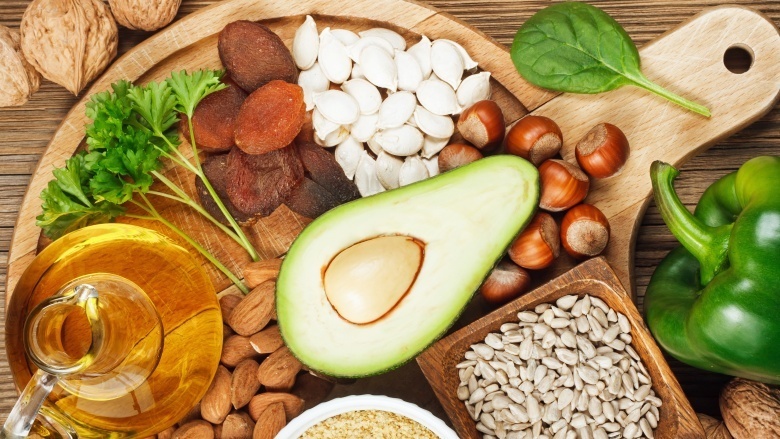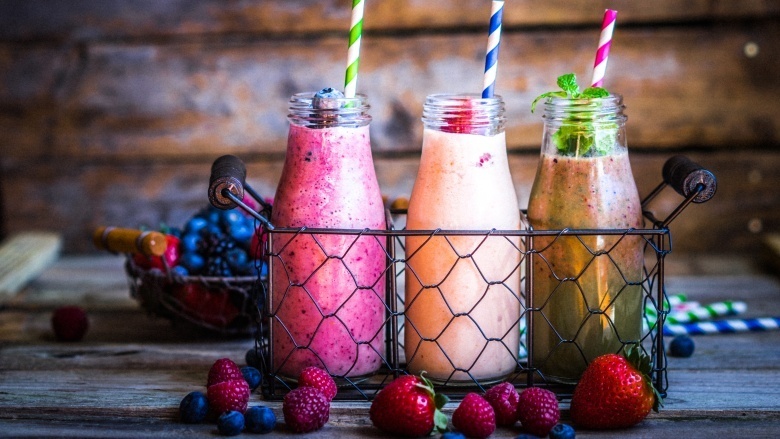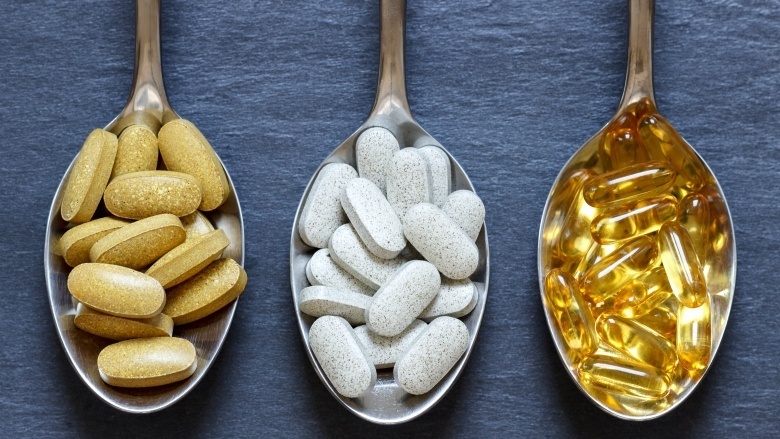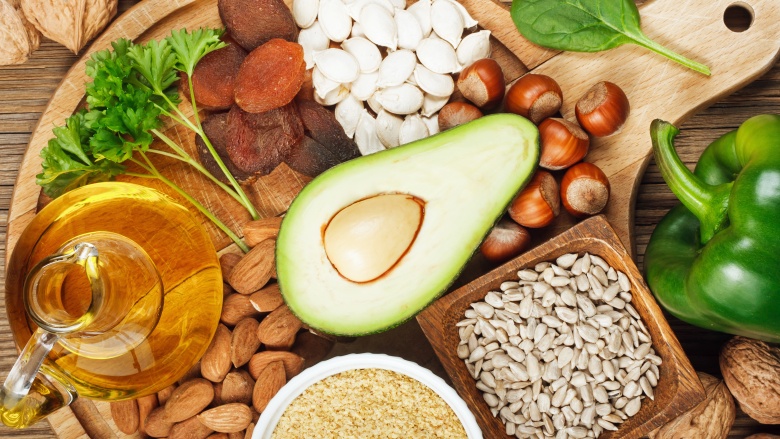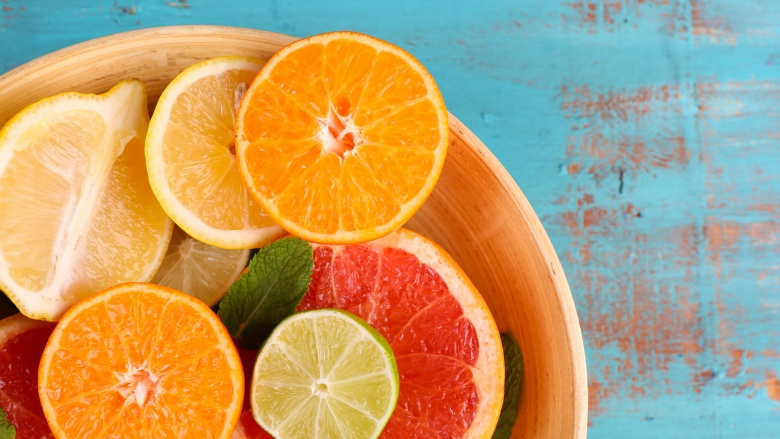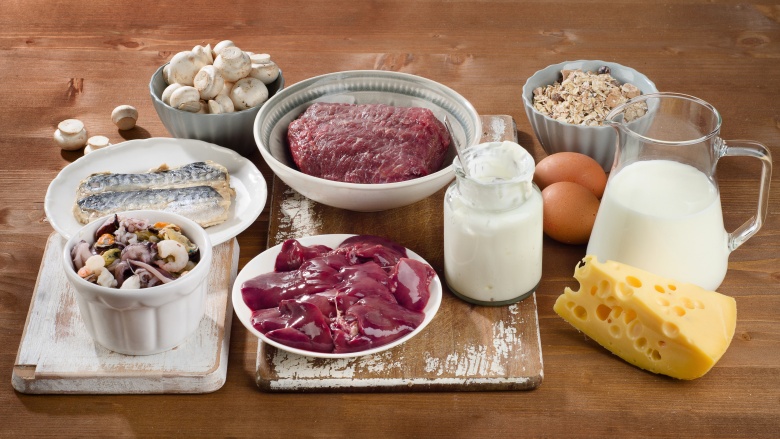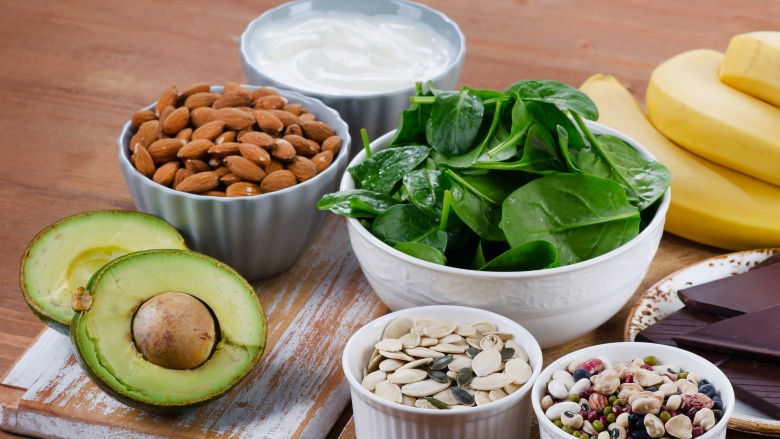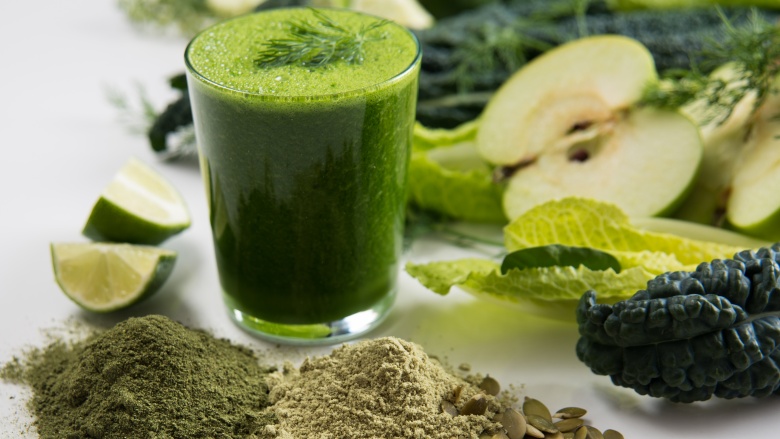The Only Vitamins You Actually Need On A Daily Basis
If you're a health nerd like me, you know the recommended nutritional guidelines are always changing. Remember when eggs were bad? Now it's okay to eat them again. It can be hard to keep up with what's healthy and what's harmful, especially when it comes to vitamins.
I'll admit, as a nurse, I've always been a little leery of vitamin supplements. It just does not feel right that because supplement companies are not regulated by the Food and Drug Administration (FDA), they can make wild health claims without proving their effectiveness or safety. We all have friends who swear by their vitamin routine. I often hear things like: "Now that I take vitamin C everyday, I don't get colds anymore!" I can't help but wonder if it's the vitamin or merely the thought of doing something healthy that makes the difference.
So if the research is always changing and companies can say whatever they like, what's the average health-conscious gal to do? We went to the experts to find out some background info, and then we'll reveal exactly which vitamins you actually need to take.
Essential vitamins we need to live
The vitamins our bodies need can be broken down into two groups: fat soluble vitamins and water soluble vitamins. Our bodies need both types to function properly.
Fat soluble vitamins need body fat to be absorbed and used by our organs. Vitamin A, vitamin E, and carotenoids are all fat soluble vitamins. Because these vitamins rely on fats to be used, we must eat a diet full of healthy fats. "A lack of healthy fats in the diet can lead to fat-soluble vitamin deficiencies, leading further into disease and malnutrition," nutritionist Amanda Henham of Vaga Nutrition tells us. "They can also become toxic, as they are stored in fatty tissue."
The other class of vitamins, water soluble vitamins, cannot be stored in our tissues like fat soluble ones. They are found in food, and once our bodies have used them, they excrete the excess in the urine. Because our bodies can't hang on to these vitamins, we need to take them in, either from food or supplements. Common water soluble vitamins include folate, vitamin C, and the B vitamins. According to Henham, everyone needs these vitamins in their diets everyday, and "the requirements increase in certain conditions such as immune disorders, poor kidney and liver health, chronic stress, and medication use."
Where should we get our vitamins?
Our experts agree that the best source of vitamins is our diet. Whole, fresh, unprocessed foods provide the vitamins our bodies crave. Board certified rehabilitation specialist Dr. Scott Schreiber focuses on obtaining vitamins from whole foods. "Whole foods are the best source of vitamins and minerals," he tells us. "If it grows from the ground, the way nature intended it, vitamins and minerals occur in their most natural states and can be absorbed the easiest."
It's also important to remember that heat can alter the makeup of the vitamins in food. "Cooking methods alter the nutritional status of fresh foods, especially the water-soluble vitamins," nutritionist Amanda Henham of Vaga Nutrition explains. "So mixing up raw and cooked foods throughout the day is ideal."
Fruits and vegetables are excellent sources of these vital nutrients. Vitamin A can be found in orange-colored vegetables like sweet potatoes and carrots. Henham recommends eating healthy fats like avocado and nuts to obtain vitamin E and leafy greens for vitamin K.
For the water soluble vitamins, reach for brightly colored fruits and vegetables like oranges, bell peppers, and berries.
Why is food not enough?
Experts say that a balanced diet is the best way to get vitamins, but there's just one problem with that. We don't eat that way! A report from the 2015 Dietary Guidelines Advisory Committee concluded that Americans do not consume enough of vitamin A, vitamin D, vitamin E, folate, vitamin C, calcium, and magnesium. We're also not getting enough iron. This is especially true for premenopausal women. The report also found that we're taking in too much sodium and saturated fat.
Registered dietitian Emily Braaten recommends trying to obtain as many vitamins from our diets as possible. "While a multivitamin may be able to fill the gap, it's not absolutely necessary to rely on supplements to meet our needs," she told me. "Simply shifting our eating pattern to include the recommended servings of fruits and vegetables can cover most of the aforementioned [vitamins]."
Why take a supplement?
Speaking with our experts, we found that they agree there are plenty of groups of people who could benefit from a supplement regimen. "With a huge increase in chronic disease and ill health, medication use, and poor dietary choices, we are seeing many individuals lacking basic nutrition from food," says nutritionist Amanda Henham of Vaga Nutrition. "Therefore a need to supplement while implementing small and incremental healthy changes may be required."
Dr. Scott Schreiber, a rehabilitation specialist, explains to his patients that it may not be possible to receive all our vitamins from food because of the soil they're grown in. "With the current state of our soil, I recommend a combination of organic whole foods and a daily multivitamin supplement." Registered dietitian Danielle Omar agrees. "Farmland soil is depleted of important vitamins and trace minerals, and our food sometimes travels thousands of miles to reach us," she says. "So once that kale reaches your dinner table, it may be well over a week old and vital nutrients are quickly dissipating."
The following slides provide details on certain crucial vitamins you need to consume every day. After you get through the list of vitamins, keep reading! We'll answer some burning questions about which foods to eat to get certain vitamins, as well as why sometimes food isn't enough.
Always talk with a professional
While the nutritionists we spoke to agree that supplements can be helpful, it's important to always talk with your healthcare provider before jumping in with a vitamin regimen. Most vitamin supplements contain 100 percent of the recommended daily amount, so if you're already consuming a healthy diet of fruits and vegetables throughout the day, you would be taking in way more than the National Institutes of Health recommends.
Unfortunately when it comes to vitamins, you really can have too much of a good thing.
According to the National Institutes of Health, a meta-analysis of studies looking at more than 400,000 people found that a daily vitamin supplement was associated with an increased cancer risk. A separate study of women found that a daily supplement was linked to an increased risk for skin cancer.
Taking vitamin A supplements with beta-carotene has been proven to increase the risk of lung cancer in study participants. In one study, the increased risk was a whopping 28 percent, which caused the researchers to actually end the study early.
Calcium supplements have not been proven to improve bone density. In fact, a study published in the American Journal of Clinical Nutrition found that participants taking a daily calcium supplement were more likely to suffer a hip fracture.
Make a plan with your doctor or nutritionist, and you'll be feeling good. As health coach Clint Fuqua tells his clients, "Seek the advice of a professional well versed in nutrition, and leave the guessing to your next choice on Netflix."
Vitamin A and carotenoids
Vitamin A is crucial for our bodies, and it does a lot more than help our peepers. Vitamin A supports a healthy immune system, reproductive system, cell health, and vision. Because vitamin A helps produce healthy cells, it also affects our vital organs like the heart and lungs. Some research has even linked taking vitamin A with improving measles and some types of cancer.
Vitamin A comes in two forms, and we need to get them both from our diets. First there is provitamin A, which is found in darkly-colored fruits and vegetables like carrots, broccoli, cantaloupe, and squash. Once we eat those fruits and vegetables, our bodies convert the provitamin A into vitamin A that our tissues can use. The most important type of provitamin A carotenoid is beta-carotene. The second type is preformed vitamin A, which is found in animal sources like dairy, fish, and meat. We can also get carotenoids from supplements, liver and fish oils, as well as palm oil, algae, and fungi. Mmm one order of algae and fungi to go please!
Most multivitamins contain vitamin A, and women should aim for about 770 micrograms of vitamin A per day.
Vitamin E
If you've been after glowing skin and shiny hair, make sure to load up on your vitamin E. Vitamin E is the fat-soluble vitamin that is full of antioxidants. Its antioxidant properties protect our cells from damaging free radicals. We are constantly exposed to dangerous free radicals from air pollution, ultraviolet radiation, or just walking though some cigarette smoke down the street. That is why it is so critical to have a steady supply of healing antioxidants to keep our cells from mutating and causing chronic disease. Vitamin E also supports our immune systems.
We can get vitamin E from our diets, as well as supplements. Foods with healthy fats like nuts, seeds, and vegetable oil are high in vitamin E. Green leafy vegetables and even fortified cereals are also good sources.
While vitamin E is available as supplements, we have to be careful to avoid high doses. If you have any kind of bleeding disorder or take blood thinners, vitamin E supplements can cause more bleeding. Some research has even linked high-dose vitamin E with an increased risk of death from any cause. Aim to get this vitamin from your diet or a multivitamin.
Folate
Folate is in the B vitamin group, and is crucial for everyone, not just the pregnant ladies. Folic acid decreases the amount of homocysteine in our blood. Homocysteine levels are used to evaluate if we're at risk for heart disease, so the lower the better. Folic acid is also linked to improving our cognitive abilities, psychiatric illness, and cardiovascular health. Because folic acid is vital for the health of unborn babies, all women considering becoming pregnant need to ensure that they are taking in enough folic acid everyday.
We can get folate from our diets by eating leafy green vegetables, fruits, nuts, beans, dairy products, poultry, meat, eggs, seafood, and grains. Some of the best sources include spinach, asparagus, and brussel sprouts. Break out the cheese and bacon – we're cooking up some delicious veggies tonight! The U.S. Food and Drug Administration (FDA) also requires many packaged foods like breads, cereals, pastas, and flours to be enriched with folate. Folate is present is such a variety of different foods, but if you're not into vegetables, fruits, grains or meat, fear not. Folic acid is also available in vitamin B supplements and in multivitamins.
Vitamin C
This is the time of year when many of us are loading up on vitamin C to avoid that inevitable cold or flu. While vitamin C may not prevent that cold, it may at least shorten it. It's also vital to forming collagen. Collagen is that compound in your skin that keeps it elastic and young-looking. We also need collagen for our bones, cartilage, muscles, and blood vessels. Like vitamin E, vitamin C also contains powerful antioxidants.
Unlike other animals, we humans can't make vitamin C, so we need to take it in everyday. Oranges are of course great sources of vitamin C, but so are other citrus fruits like grapefruits and lemons. Bell peppers, tomatoes, broccoli, strawberries, kiwifruit, and cantaloupe are also rich in vitamin C. To get the most vitamin C bang for your buck, enjoy your fruits and veggies raw. Because this vitamin is water-soluble, heating and cooking your food can decrease the amount of vitamin that your body can absorb. Have a nice fruit salad in the morning, then fresh bell peppers dipped in hummus for an afternoon snack.
Vitamin B6
Feeling blue or just off? Make sure you're getting enough vitamin B6. Vitamin B6 helps the body make serotonin and norepinephrine, which are chemicals that help the brain send signals. It also aids in our cognitive development, so don't forget to take it. Vitamin B6 helps form myelin around our nerves, which helps our brains send signals throughout our bodies. Not having enough vitamin B6 can lead to problems in the nerves, skin, and circulation. The jury is still out, but some research has linked taking a vitamin B6 supplement to improved premenstrual syndrome (PMS) symptoms. Some of the common symptoms like breast pain, depression, and anxiety could be eased by taking some vitamin B6 around that time.
According to the Mayo Clinic, mild vitamin B6 deficiency is common, so make sure you're getting enough everyday. Vitamin B6 can be found in cereal, legumes such as beans or peanuts, vegetables, milk, cheese, eggs, and meat. It's highest in fish, beef liver, organ meats, potatoes, and starchy vegetables. It is also included in vitamin B supplements.
Vitamin B12
Vitamin B12 is usually found in animal products and helps our bodies produce new red blood cells. Our bodies can store up to a couple years' worth of vitamin B12 in our livers, so not everyone needs to take this everyday. One group who should look into a vitamin B12 supplements are vegetarians. Vitamin B12 binds to the proteins in our food and can be found in fish, shellfish, meat, eggs, and dairy products. This is why it can be tricky for strict vegetarians and vegans to get enough of this vitamin. It's usually not found in plant foods, but now some cereals have been fortified with vitamin B12. Those with low levels of vitamin B12 will notice fevers and sweating.
Vitamin D
Our bodies need vitamin D for healthy bone growth. Vitamin D is usually added to calcium supplements, because it helps our bodies be able to absorb the calcium. A vitamin D deficiency will lead to weak, brittle bones and pain.
Unlike the other vitamins in this list, vitamin D isn't so easy to get from food. We can take in vitamin D from supplements or our bodies can make it when we're exposed to sunlight. All you need is 10 minutes outdoors each day to get your fix. Vitamin D can be found in some fatty fish like salmon or tuna, as well as beef liver, cheese, and egg yolks. Some foods like milk and cereals are now fortified with vitamin D as well. The easiest way to get your vitamin D is with a daily fish oil supplement.
Calcium
Got milk? Calcium is the most abundant mineral in our bodies, and has always been famous for protecting our teeth and bones, but its benefits go far beyond our skeletons. Calcium has been linked to protecting against cancer, diabetes, and high blood pressure. It also helps our bodies' nerves and muscles work properly. Getting enough calcium is especially important for kids, as they won't reach their full adult height if they're deficient.
Our bodies need to receive calcium everyday to protect our bones. Our blood requires a certain amount of calcium in it, so when it's low, our blood just pulls it from our bones. This keeps our blood safe and working, but weakens our bones. It's important to eat calcium-rich foods daily, especially for most children and teen girls who aren't getting enough. Of course dairy products like yogurt, cheese, and milk are good sources, but so are leafy green vegetables, fish, and soy products. As we mentioned earlier, our bodies need enough vitamin D to be able to absorb the calcium that we take in. Most of us can get enough calcium from food, but there are certain groups who could benefit from a supplement. According to the Mayo Clinic, some groups who should consider the supplement are those who are vegan, lactose intolerant, taking steroids, have celiac or osteoporosis.
Magnesium
Magnesium is a mineral that we can absorb from food, supplements, or even some medications. Our bodies need a sufficient amount of magnesium to keep our muscles and nerves working. Magnesium also helps with controlling blood sugar levels and blood pressure.
It's relatively easy to take in magnesium from our diets. Some foods that are rich in magnesium include green leafy vegetables, nuts, seeds, and whole grains. Magnesium has also been added to fortified cereals and bottled water. Whole wheat bread should be high in magnesium, but other types like white bread have been stripped of most of their magnesium content. When we eat magnesium-rich foods, our bodies will absorb about 30 to 40 percent of the mineral. We can also get magnesium from supplements. Adults should aim for about 270 to 400 milligrams per day. If you decide to try the supplement, do yourself (and your family) a favor and take it with food to avoid diarrhea.
Iron
Our bodies need to receive iron everyday to be able to make enough new red blood cells. Our red blood cells are responsible for bringing fresh oxygen all over the body. When we don't have enough iron, we can develop anemia. Not having enough iron can leave us feeling tired and short of breath. It can even lead to learning problems and infections.
To make sure you're eating enough iron, look for animal products like lean red meat, chicken, turkey, and fish. Women should aim for 10 to 15 milligrams of iron per day. If you and your doctor decide it's time to try an iron supplement, make sure to take it on an empty stomach, unless you have a sensitive stomach. Women who are pregnant especially need to make sure they are taking an iron supplement or getting enough from their diets. Our blood volume grows when we're pregnant, so we'll need more iron to keep up and give the baby a healthy environment.

